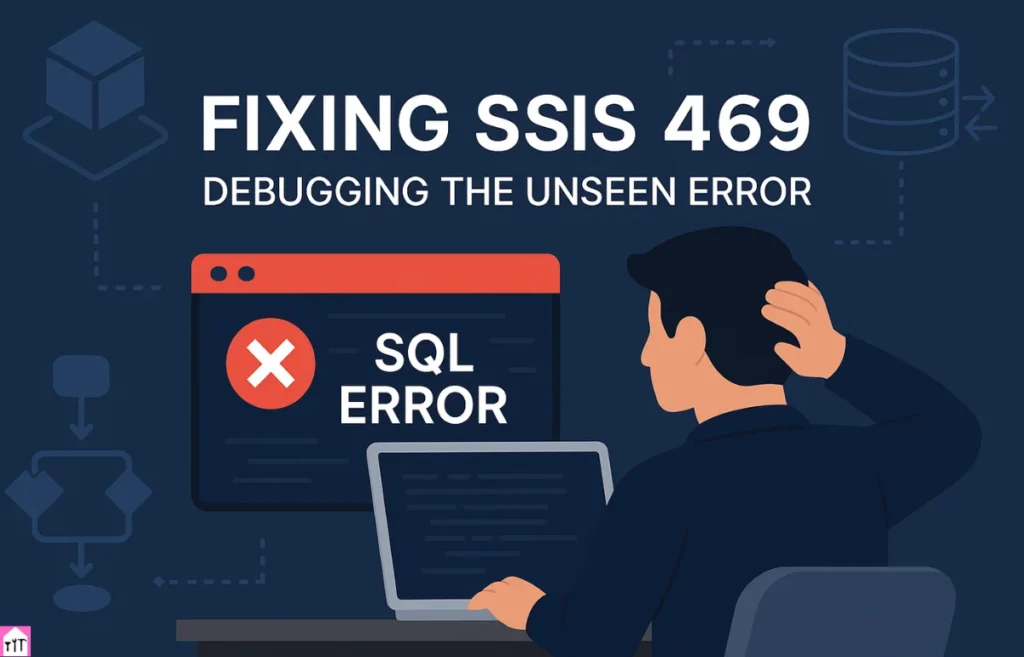
In the world of SQL Server Integration Services (SSIS), encountering cryptic error codes is a part of the development journey. One such elusive issue is the SSIS 469 error. While this specific code isn’t officially documented by Microsoft, it’s frequently reported by SSIS developers in online communities, suggesting that it’s a fairly common roadblock. This article walks you through what “ssis 469” typically means, how to trace its source, and proven methods to resolve it.
What Is SSIS 469 and Why Is It Hard to Trace?
The biggest challenge with SSIS 469 is that it’s not listed in the official Microsoft error documentation. Instead, it behaves more like a generic or “catch-all” error thrown when something deeper is going wrong, often related to custom scripts, external process calls, or misconfigured components.
In most cases, SSIS 469 doesn’t come alone. It’s usually accompanied by context-specific error messages that hint at what’s actually broken. That’s where you, as a developer or data engineer, need to become a bit of a detective.
Common Scenarios That Trigger SSIS 469
Based on community case studies and known best practices, here are the main culprits behind this error:
1. Script Task Failures
If you’re using Script Tasks in C# or VB.NET, an uncaught exception can throw a generic error like SSIS 469.
Fix:
Check for data type mismatches, null references, or API calls that may be failing.
Wrap your code in try-catch blocks and log the exact exception.
Use the SSIS debugger to step through the script and pinpoint failure lines.
According to Microsoft’s official SSIS documentation, improper script termination or unhandled exceptions often result in vague error codes during runtime.
2. Custom Component Breakdowns
Packages that integrate third-party or in-house custom components can encounter errors not caught by default SSIS handlers. These often manifest as generic codes, like SSIS 469.
Fix:
Review logs produced by the custom component (if available).
Check compatibility with your current SQL Server version.
Isolate the component in a test package to confirm it’s the source.
3. Connection Manager Issues
A faulty or misconfigured Connection Manager can lead to unstable SSIS execution and throw uninformative errors like SSIS 469.
Fix:
Double-check connection strings and authentication credentials.
Test the connection outside SSIS using SQL Server Management Studio (SSMS).
Verify that drivers and providers are correctly installed on the host machine.
4. Data Type Mismatches in Data Flow
Improper data type conversions during transformations (e.g., casting strings to integers or working with date formats) can silently fail, resulting in this error.
Fix:
Use Derived Column Transformation to explicitly cast values.
Add Data Viewers to monitor values flowing between transformations.
5. External Process Failures
SSIS allows you to run executables or batch files using the Execute Process Task. If these fail and don’t report back cleanly, they can trigger SSIS 469.
Fix:
Run the external process manually using the command line and check for exit codes or errors.
Check that the SSIS account has execute permissions on the process or script.
Look into the logs created by the external task.
6. Server Resource Constraints
Running packages on a server that’s low on memory, CPU, or disk space can result in unstable behavior and vague errors.
Fix:
Monitor system performance using Performance Monitor (PerfMon) or Task Manager.
Optimize memory usage in large packages or split them into smaller workflows.
Table: SSIS 469 Common Causes & Solutions
| Possible Cause | Symptoms | Recommended Action |
|---|---|---|
| Script Task Failure | Error in execution or crash | Add try-catch blocks, and debug with breakpoints |
| Custom Component Issue | The package halts unexpectedly | Check version compatibility, isolate the component |
| Connection Problem | Timeout or access error | Test credentials, verify connection strings |
| Data Conversion Error | Invalid cast or overflow | Use Derived Column, apply explicit conversions |
| External Task Failure | Executable fails silently | Test manually, check process logs, and exit codes |
| Resource Constraint | The package runs slowly or freezes | Optimize package, monitor server metrics |
Best Practices for Troubleshooting SSIS 469
Isolate the Error Source
Use OnError event handlers, breakpoints, and checkpoints to narrow down the specific component causing the issue.
Implement Robust Logging
Leverage SSIS logging options such as:
SQL Server log provider
Text file log provider
Windows Event Logs
Track variable values, task status, and custom messages to understand execution flow.
Use SSIS Debugger
This often-overlooked tool allows you to:
Step through the Script Tasks line by line
Observe variable values in real time
Pause execution when errors occur
Revert Recent Changes
If the package was recently updated, roll back changes one by one and rerun the package. This helps isolate faulty updates.
Expert Tip: Check Version Compatibility
SSIS behaves differently across SQL Server versions. A script that runs fine on SQL Server 2016 might break on 2019 due to subtle syntax or behavior changes.
Always test your package in the target deployment environment to avoid version-induced bugs.
Additional Resources
Microsoft Docs on SSIS Troubleshooting
Stack Overflow SSIS Tag – https://stackoverflow.com/questions/tagged/ssis
SQLShack’s article on Debugging SSIS
Frequently Asked Questions (FAQs)
What is SSIS 469?
SSIS 469 is an undocumented error code seen in SQL Server Integration Services. It typically surfaces during script failures, connection issues, or external task errors.
Is SSIS 469 an official Microsoft error?
No. It is not listed in Microsoft’s official error code documentation, which makes it harder to debug directly.
How can I identify which task is causing the SSIS 469 error?
Use breakpoints, enable logging, and isolate each package component during testing to narrow down the issue.
Can server memory issues cause this error?
Yes. If your server is low on memory or CPU, it can cause instability in SSIS execution and result in generic error codes like SSIS 469.
Where can I find help for SSIS 469?
You can consult Microsoft Docs, developer communities like Stack Overflow, and technical blogs focused on SQL Server development.
Conclusion
While SSIS 469 may not come with a clear definition, it’s a warning sign that something deeper is misfiring in your SSIS package. Whether it’s a broken script, misconfigured component, or incompatible version, diagnosing the issue requires careful analysis, logging, and testing. By following structured debugging practices and leveraging SSIS tools smartly, you can uncover the real cause and restore your package’s stability.
Next Step: If you’ve tried all the strategies above and still face issues, consider running your package in Visual Studio’s debug mode and sharing full logs with experienced SSIS developers in community forums. It’s often the quickest way to a solution.
